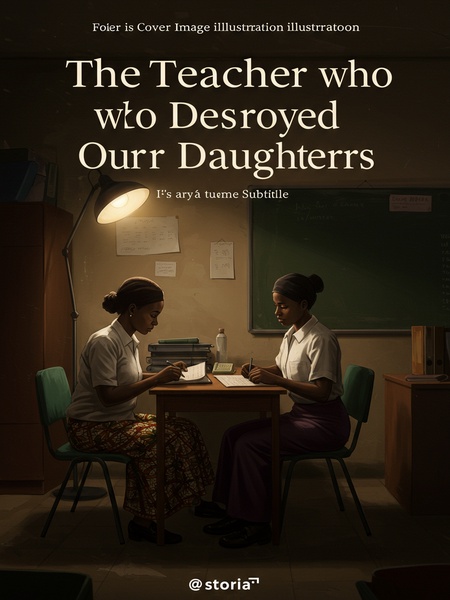Chapter 3: Searching for Shadows
To find the truth, Tunde Bello and I decided to go round the whole village, including the local primary school.
We moved from compound to compound, walking the red earth tracks that crisscrossed the village. The air smelled of cassava and wood smoke. Some women eyed us with suspicion, others with silent hope.
This was a small village, and most of the young people had left for the city. Most people living there were old people and children.
Some of the elders sat under the mango tree, chewing kola and gossiping. A group of boys played draft beside the provision store, shouting at every lucky move. Every face seemed marked by worry.
Ifunanya had two close friends: Amina and Blessing. They were classmates and also left-behind children.
The trio had a reputation for being inseparable, always walking together, always giggling. Their friendship was one of those small joys in a hard place.
We spoke briefly with them in front of their guardians. But, scared by Ifunanya’s death, the girls hardly said anything, so we only got a few basic facts.
Amina stared at the ground, twisting the hem of her dress. Blessing clung to her grandmother’s wrapper, hiding her face. Tunde tried to soften his voice, but the girls were frozen, as if any wrong word would bring down thunder.
First, the three of them would sometimes go together to the town park on weekends, about once a month. It wasn’t far—just a thirty-minute walk. Coincidentally, they had gone last weekend too.
Blessing’s grandmother chimed in: “Na that park dem dey go play o. Sometimes dem dey come back with pure water and sweet.” The girls nodded, barely audible.
Second, after school on weekdays, they often played at a small kiosk, buying sweets, doing homework, and watching TV.
The kiosk was famous for its cold Fanta and old black-and-white TV. Sometimes, half the village’s children would squeeze inside, shouting over Nollywood movies.
We visited this kiosk. The owner was Baba Kola, a sixty-year-old bachelor farmer—an old bachelor, as the villagers called him.
He wore patched trousers and a faded cap, face lined like old leather. Everyone called him Baba Kola, but some children whispered his real name was Olayiwola. He always had a word for every child and a story for every adult.
He remembered Ifunanya well, but said it was always just the three girls that came; he hardly ever saw any men with them.
He scratched his head, repeating, “Dem dey always come together, na dem own world. No man dey waka with dem.” He seemed as baffled as we were.
Third, at their school, the headmaster was already overwhelmed by the case, as the public pressure was too much.
The headmaster’s office was packed with files and the smell of dust. He shook our hands weakly, sweating even though the fan spun overhead. “I beg, help us solve this thing quick,” he pleaded.
Ifunanya’s class teacher was Mr. Okoli, a rough-looking middle-aged man.
He had the look of someone who’d seen too much—crumpled shirt, sandals with one broken strap, and a frown that never left his face.
He was chewing kola nut as he spoke, saying he had to handle three classes by himself and couldn’t monitor everything, so he wasn’t clear on the details.
He spat the kola nut shell into his palm, wiping his mouth with the back of his hand. “Oga, school no easy. Sometimes I dey teach up to fifty children. I no fit see everybody own problem.”
Even Papa Chukwudi, who lived with Ifunanya, didn’t notice her pregnancy. For a class teacher who didn’t care much, it was not surprising he didn’t notice too.
Tunde and I exchanged glances. In truth, how could an overworked teacher notice what even a grandfather missed?
There were many left-behind children at the school, but teachers were very few. What Mr. Okoli said made sense.
The whole school looked tired—paint peeling, children’s voices echoing down empty corridors. Teachers did what they could, but it was never enough.
That was the main part of our early investigation into Ifunanya’s case.
I jotted everything in my tattered notebook, feeling the burden of every unasked question. We had clues, but nothing solid. The village moved on as if waiting for us to deliver a miracle.
I’m giving all these details because inside them lies the real root of the evil in this matter.
Sometimes, evil doesn’t come with horns and fire—it comes quietly, hiding behind neglect and silence. The things unsaid, the people unseen.
Just as we were arranging all this information and planning to widen our investigation, something dramatic happened.
The village, which had been holding its breath, suddenly erupted into chaos, as if everybody decided they couldn’t wait any longer for answers.
Continue the story in our mobile app.
Seamless progress sync · Free reading · Offline chapters